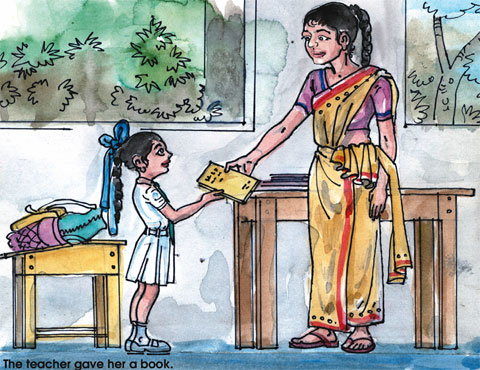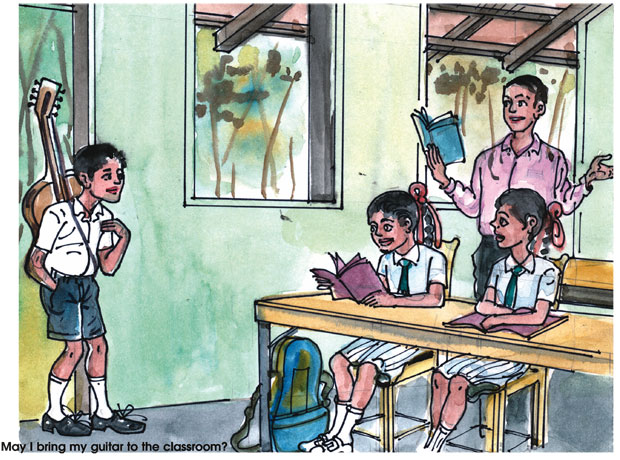|

by R. S. Karunaratne
Verbs with two objects
Some verbs such as 'give, lend, promise' or 'send' can have two
objects. Usually, there is a person and a thing in such a sentence. If
we use the person last, we use the preposition 'to.'

Without 'to'
The company gave him a promotion.
I sent him a birthday card.
The teacher gave her a book.
The bank lent him Rs 50,000.
The minister promised us a house.
With 'to'
The company gave a promotion to him.
I sent a birthday card to him.
The teacher gave a book to her.
The bank lent Rs 50,000 to him.
The minister promised a house to us.
Note: The structure with the person first is more common than the person
last.
Amanda has been promised a scholarship to Australia if she passes her
examination.
We have been shown several houses but we haven't seen one we like.
The students have been given one week to finish their assignment.
I was sent an invitation to old boy's get-together but I don't thin I'll
go.
We are being offered a new house while ours is being repaired.
[Activity]
Make two sentences with each set of words using the simple past passive.
Use capitals where necessary.
1. give / each student / a pen
.......................................
.......................................
2. lend / Rs 50,000 /each farmer / the bank
.......................................
.......................................
3. promise / Sam / a mobile phone / father
........................................
........................................
4. send / some parents / two invitations / by mistake
.........................................
.........................................
5. show / most of the students / a film about wild elephants
..........................................

..........................................
********************
Key:
1. Each student was given a pen.
A pen was given to each student.
2. Each farmer was lent Rs 50,000 by the bank.
Rs. 50,000 was lent to each farmer by the bank.
3. Sam was promised a mobile phone by father.
A mobile phone was promised to Sam by father.
4. Some parents were sent two invitations by mistake.
Two invitations were sent to some parents by mistake.
5. Most of the students were shown a film about wild elephants.
A film about wild elephants was shown to most of the students.
***********************
Match words and meanings
Here's a novel way to enrich your vocabulary. Match the words in
Column 'A' with the meanings in Column 'B' and check your answers with
the key. The first one has been done for you.
[Column A]
N 1. cab
... 2. cabbie
... 3. cabin
... 4. cache
... 5. cackle
... 6. cacophony
... 7. cadaver
... 8. cadence
... 9. cakewalk
... 10. calamity
... 11. calcify
... 12. calf
... 13. calibre
... 14. calligraphy
... 15. callous
... 16. calm
... 17. camaraderie
... 18. camper
... 19. canard
... 20. candid
... 21. candour
... 22. canine
... 23. canker
... 24. canned
... 25. cannery
[Column B]
A. beautiful writing
B. the quality of somebody or something
C. a young cow
D. to become hard
E. a serious accident
F. Something which is very easy to achieve
G. the regular rise and fall of the voice
H. a dead human body
I. an unpleasant mixture of loud sounds
J. to make the unpleasant sound of a chicken
K. a hidden store of things
L. a small, simple house made of wood
M. a driver of a taxi
N. a taxi
O. a factory where food is put into metal containers
P. preserved in a metal container
Q. a disease which attacks the wood of trees
R. of or relating to dogs
S. the quality of being honest
T. honest
U. a false report intended to deceive people
V. somebody who stays in a tent
W. a feeling of friendliness towards people you work with
X. peaceful and quiet
Y. unkind and cruel
***************
Key:
2. M 3. L 4. K 5. J 6. I 7. H 8. G 9. F 10. E 11. D 12. C 13. B 14. A
15. Y 16. X 17. W 18. V 19. U 20. T 21. S 22. R 23. Q 24. P 25. O
***************
Starters:
How to ask for or refuse permission
We use ‘can, could’ or ‘may’ to ask for permission.
Can I use use your computer?
Can I ride your bicycle?

Can I play with your children?
Can I go home now?
Can I pay later?
Could we borrow your ladder, please?
Could we use your classroom for dancing practices?
Could we play cricket in your garden?
Could I sit here?
Could I borrow your pen, please?
May I go out, please?
May I bring my guitar to the classroom?
May I wait for you at the gate?
May I know your name, please?
May I come along with you?
How to give permission
To give permission we use ‘can’ or ‘may’ but not ‘could.’
You can play my violin if you like.
You may meet me in office on Monday.
You may pay a little less than the usual price.
You can wait here if you like.
You can write or type your application.
A: Could I borrow your dictionary?
B: Of course you can.
You may display your notices on this board.
How to refuse permission
To refuse permission we use ‘can't’, ‘may not’ ‘should not’ or ‘must
not’ but not ‘couldn't.’
A: Could we use your table to have our meals?
B: I am afraid you can't.
Members may not bring more than one guest into the club.
Children should not be left here unattended.
Luggage must not exceed 30 kilogrammes.
We use ‘can’ to talk about the present and ‘could’ for the past.
Each member can bring one guest to the party.
Sometime ago, members could bring two guests to the party.
We can also use ‘be allowed to’
I may please be allowed to take my annual leave next month.
Passengers are allowed to keep one bag with them.
Future: Will I be allowed to sit the examination next year?
Past: We weren't allowed to photograph the artefacts.
Sometimes, there is a clear distinction between ‘may’ and ‘be allowed
to.’
May I take a photo of you? (= will you permit me to take a photo of
you?)
Am I allowed to take photos here? (= Is there a rule about taking
photographs here?)
[Activity]
Use ‘may I’ or ‘Am I allowed to’ in the blanks and check your answers
with the key.
1. ............... use your toilet?
2. ............... smoke in the classroom?
3. ............... take a U-turn here?
4. ............... ask you a personal question?
5. ............... drive a car without a licence?
6. ............... read your newspaper?
7. ............... borrow more than two books?
8. ............... have a birthday party in school?
9. ............... bring my mobile phone to the classroom?
10. ............. bring my laptop to office?
******************
Key:
1. May I
2. Am I allowed to
3. Am I allowed to
4. May I
5. Am I allowed to
6. May I
7. Am I allowed to
8. Am I allowed to
9. Am I allowed to
10. Am I allowed to
******************
Quiz on idioms
An idiom is a special kind of phrase. It is a group of words which
have a different meaning when used together from the one it would have
if the meaning of each word were taken individually. Read the idiomatic
expression in bold type and tick the answer you think is correct. Check
your answers with the key.
1. If you have something down to a fine art ...
(a) you know the best way of doing it
(b) you do not know the best way way of doing it
(c) you don't know how to do it
2. If you have a rude awakening ...
(a) you get up suddenly
(b) you've been forced to realise the unpleasant truth about something
(c) you do not know what is happening
3. If an axe is hanging over something ...
(a) it is likely to be auctioned soon
(b) it is likely to be upgraded soon
(c) it is likely to be destroyed soon
4. If you get the axe ...
(a) you lose your job
(b) you get a promotion
(c) you get a foreign trip
5. If you have an axe to grind ...
(a) you wish to help somebody
(b) you have prejudices about something or somebody
(c) you are impartial in your judgment
6. If somebody describes you as a babe in arms ...
(a) you are very young
(b) you're highly experienced
(c) you're unreliable
7. If you refer to people as babes in the wood ...
(a) they are immature
(b) they are cunning
(c) they are innocent
8. If you're left holding the baby ...
(a) you're made responsible for a problem
(b) you're compelled to adopt the baby
(c) you're responsible for the maintenance of the baby
9. If you want to see the back of somebody ...
(a) You want to meet them again
(b) you like them
(c) you don't like them
10. If somebody says something behind your back ...
(a) they say unpleasant things about you
(b) they praise you
(c) they admire you secretly
**************
Key:
1. (a) 2. (b) 3. (c) 4. (a) 5. (b) 6. (a) 7. (c) 8. (a) 9. (c) 10.
(a)
************** |

